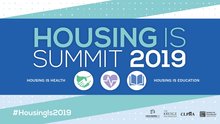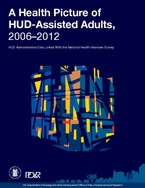0
Video
Community:
Jun 17, 2022
The Administration for Community Living’s Aging and Disability Network is a multifaceted service infrastructure for older adults and people with disabilities so they can find housing and obtain services like chore assistance, delivered meals, and transportation. By partnering with this community infrastructure, PHAs can improve voucher utilization and leverage and align resources so older adults, people with disabilities, and people experiencing homelessness —all priority populations for federal housing assistance—can obtain supportive services needed to attain housing stability, optimize well-being, and avoid homelessness and costly institutional care. Join this session to learn about PHA partnerships with this infrastructure, discuss the dynamics of cross-sector partnerships in community-driven approaches, and discover opportunities available through the Housing and
Services Resource Center.
Authored by:
Topics: Advocacy, Community development, Disabilities, Health, Housing, Partnerships, Research, Seniors, Supportive housing, Sustainability
 Shared by Karina George
Shared by Karina George
Karina George posted a
on Jun 17, 2022
The Administration for Community Living’s Aging and Disability Network is a multifaceted service infrastructure for older adults and people with disabilities so they can find housing and obtain services like chore assistance, delivered meals, and transportation.
0
Report
Community:
Jun 6, 2019
Trends in Housing Assistance and Who it Serves
Authored by: PAHRC
Topics: Community development, Disabilities, Education, Funding, Health, Homelessness, Housing, Legislation & Policy, Low-income, Partnerships, Research, Seniors, Workforce development, Youth
 Shared by Keely Stater
Shared by Keely Stater
Keely Stater posted a
on Sep 10, 2019
Trends in Housing Assistance and Who it Serves
0
Report
Community:
In 2017, the Bipartisan Policy Center and the Center for Outcomes Research and Education (CORE) spoke with over 90 national thought leaders and stakeholders about the current state of rural health care in the Upper Midwest region, including Iowa, Minnesota, Montana, Nebraska, North Dakota, South Dakota, and Wyoming. BPC and CORE used these discussions to determine the real-world implications of existing federal policies, to understand ongoing care challenges, and to identify opportunities for improvement in rural health care access and delivery.
Authored by: Bipartisan Policy Center
Topics: Health, Low-income, Midwest, Research, Seniors
 Shared by Housing Is
Shared by Housing Is
Housing Is posted a
on Jun 12, 2019
In 2017, the Bipartisan Policy Center and the Center for Outcomes Research and Education (CORE) spoke with over 90 national thought leaders and stakeholders about the current state of rural health care in the Upper Midwest region, including Iowa, Minnesota, Montana, Nebraska, North Dakota, South Dak
0
Video
Community:
May 24, 2019
With ever-growing interest in the intersection between housing and health, researchers are evaluating the impact of cross-sector interventions. This session will bring together researchers to share insights from their work relevant to practitioners and policymakers.
Authored by: Housing Is, CLPHA
Topics: CLPHA, Health, Homelessness, Housing, Low-income, Partnerships, Research, Seniors
 Shared by Housing Is
Shared by Housing Is
Housing Is posted a
on May 24, 2019
With ever-growing interest in the intersection between housing and health, researchers are evaluating the impact of cross-sector interventions. This session will bring together researchers to share insights from their work relevant to practitioners and policymakers.
0
Publication
Community:
Apr 24, 2019
The Centers for Medicare and Medicaid Services (CMS) and states spend over $300 billion per year on the care of dually eligible individuals, yet still do not achieve acceptable health outcomes. In a 2016 study of social risk factors in the Medicare value-based purchasing programs, dual enrollment status was the most powerful predictor of poor outcomes. For example, relative to Medicare-only beneficiaries, dually eligible individuals had 10-31 percent higher risk-adjusted odds of hospital readmission across conditions measured in the Hospital Readmissions Reduction Program, and scores were lower for dually eligible individuals on nearly all (17 of 19) beneficiary-level quality measures in Medicare Advantage.
Authored by: Seema Verma for Health Affairs
Topics: Dual-eligibles, Funding, Health, Low-income, Medicaid / Medicare, Research, Seniors
 Shared by Housing Is
Shared by Housing Is
Housing Is posted a
on Apr 24, 2019
Seema Verma for Health Affairs
The Centers for Medicare and Medicaid Services (CMS) and states spend over $300 billion per year on the care of dually eligible individuals, yet still do not achieve acceptable health outcomes.
0
Publication
Community:
Apr 11, 2019
High-need, high-cost (HNHC) individuals are defined as people of all ages living with clinically complex needs and functional limitations who also incur high health care costs or are likely to do so in the near future. Despite frequent contact with the health care system and substantial medical spending, the physical, social, and behavioral health needs of these individuals often remain unmet due to uncoordinated and fragmented care. Studies suggest that HNHC individuals could benefit from a more holistic approach that coordinates the care they receive and addresses their unmet social needs. Doing so could improve quality of care and quality of life while reducing health care service use
Authored by: Janet Niles, Teresa Litton, and Robert Mechanic for Health Affairs
Topics: Affordable Care Act, Disabilities, Health, Research, Seniors
 Shared by Housing Is
Shared by Housing Is
Housing Is posted a
on Apr 11, 2019
Janet Niles, Teresa Litton, and Robert Mechanic for Health Affairs
High-need, high-cost (HNHC) individuals are defined as people of all ages living with clinically complex needs and functional limitations who also incur high health care costs or are likely to do so in the near future.
0
Report
Community:
Jan 1, 2019
This report focuses on the homelessness and health care use of older homeless adults in New York City, specifically those 55 years of age or older. Recent evidence suggests a unique cohort effect of postWorld War II “baby boomers” born between 1955 and 1965 who have shown a disproportionately high
risk of homelessness over the last two decades.
Authored by: Dennis Culhane, Dan Treglia, Randall Kuhn, Kelly Doran, Eileen Johns, and Maryanne Schretzman for Actionable Intelligence for Social Policy
Topics: Cost effectiveness, East Coast, Health, Homelessness, Housing, Low-income, Research, Seniors
 Shared by Housing Is
Shared by Housing Is
Housing Is posted a
on Apr 11, 2019
Dennis Culhane, Dan Treglia, Randall Kuhn, Kelly Doran, Eileen Johns, and Maryanne Schretzman for Actionable Intelligence for Social Policy
This report focuses on the homelessness and health care use of older homeless adults in New York City, specifically those 55 years of age or older.
0
Report
Community:
Jan 1, 2019
This report is intended to accompany a report entitled The Emerging Crisis of Aged Homelessness: Could Proposed Housing Solutions Be Funded from Avoidance of Excess Hospital and Nursing Home Costs?, which reports on findings from a multi-site study involving the analysis of data from Boston, Los Angeles and New York City. That report is motivated by recent evidence documenting a cohort effect in the single adult homeless population, wherein persons born between 1955 and 1964 have faced a disproportionate risk of homelessness over the past two decades.
Authored by: Thomas Byrne, Daniel Miller, and Jae Quinn for Actionable Intelligence for Social Policy
Topics: Cost effectiveness, East Coast, Health, Homelessness, Housing, Low-income, Research, Seniors
 Shared by Housing Is
Shared by Housing Is
Housing Is posted a
on Apr 11, 2019
Thomas Byrne, Daniel Miller, and Jae Quinn for Actionable Intelligence for Social Policy
This report is intended to accompany a report entitled The Emerging Crisis of Aged Homelessness: Could Proposed Housing Solutions Be Funded from Avoidance of Excess Hospital and Nursing Home Costs?, which reports on findings from a multi-site study involving the analysis of data from Boston, Los Ang
0
Publication
Community:
Could Housing Solutions be Funded by Avoidance of Excess Shelter, Hospital, and Nursing Home Costs?
Authored by: Actionable Intelligence for Social Policy
Topics: Cost effectiveness, Health, Homelessness, Housing, Legislation & Policy, Research, Seniors
 Shared by Housing Is
Shared by Housing Is
Housing Is posted a
on Apr 11, 2019
Actionable Intelligence for Social Policy
Could Housing Solutions be Funded by Avoidance of Excess Shelter, Hospital, and Nursing Home Costs?
0
Report
Community:
Apr 8, 2019
While the program has changed very little since its inception, the need for the program has increased. In 1975, the number of program grantees stood at 594. Today, the number of grantees stands at 1,268 as more communities qualify to receive direct program allocations. Based on a CDBG Needs Survey conducted by the CDBG Coalition (and discussed later in this report), CDBG grantees have delayed and canceled projects and reduced or permanently eliminated programs because of a lack of CDBG funds. CDBG is an important investment tool for communities and neighborhoods, but program funding must increase to meet local need to ensure CDBG grantee communities are healthy, vibrant and thriving.
Authored by:
Topics: Community development, Funding, Health, Homelessness, Housing, Legislation & Policy, Low-income, Partnerships, Research, Safety, Seniors
 Shared by Housing Is
Shared by Housing Is
Housing Is posted a
on Apr 8, 2019
A report of the CDBG Coalition
While the program has changed very little since its inception, the need for the program has increased. In 1975, the number of program grantees stood at 594. Today, the number of grantees stands at 1,268 as more communities qualify to receive direct program allocations.
0
Research
Community:
Feb 5, 2019
Housing is considered a social determinant of health, with poor housing conditions being associated with poor health. Veterans with disabilities are more likely to experience a housing crisis because of combat experiences and employment instability. We identified facilitators and barriers to finding and maintaining rental housing. We sought to understand the housing needs of Veterans with military-related disabilities using the biopsychoecological model (BEM) as an organizing framework.
Authored by: Semeah, Ahrentzen, Cowper-Ripley, Santos-Roman, Beamish, and Farley for Housing Policy Debate
Topics: Disabilities, Funding, Health, Homelessness, Housing, Legislation & Policy, Research, Safety, Seniors, Stability
 Shared by Housing Is
Shared by Housing Is
Housing Is posted a
on Mar 14, 2019
Semeah, Ahrentzen, Cowper-Ripley, Santos-Roman, Beamish, and Farley for Housing Policy Debate
Housing is considered a social determinant of health, with poor housing conditions being associated with poor health. Veterans with disabilities are more likely to experience a housing crisis because of combat experiences and employment instability.
0
Report
Community:
May 1, 2018
Housing and health systems need to work together. Public housing authorities (PHAs) are significant providers of housing to those in need, offering the health sector scale and expertise. Little was known about how PHAs worked with the health sector writ large. With a national survey, we found that PHAs across the country are engaged in a wide range of partnerships with different health organizations that address various target populations and health priorities. Barriers to housing-health collaboration, such as funding and staffing capacity, can be overcome with cross-system partnerships that seek to address these needs.
Authored by: CLPHA and PAHRC
Topics: Child welfare, Funding, Health, Housing, Low-income, Medicaid / Medicare, Partnerships, Preventative care, Research, Seniors, Smoke-free
 Shared by Housing Is
Shared by Housing Is
Housing Is posted a
on Dec 19, 2018
Housing and health systems need to work together. Public housing authorities (PHAs) are significant providers of housing to those in need, offering the health sector scale and expertise. Little was known about how PHAs worked with the health sector writ large.
0
Report
Community:
Nov 1, 2018
These 65 million older households are highly diverse in their living situations, financial resources, health and functional abilities, and life stages, and thus require different types of housing to meet their needs and preferences. Affordable, accessible housing located in age-friendly communities and linked to health supports is in particularly short supply. Demand for these units will only increase when the baby boomers start to turn 80 in less than a decade. And whether they own or rent, millions of older households struggle to pay for their housing and other basic necessities, and their numbers are rising. Households now in their 50s to mid-60s are especially at risk of having insufficient resources to manage rising healthcare and housing costs in their later years.
Authored by: Joint Center for Housing Studies of Harvard University
Topics: Health, Housing, Research, Seniors
 Shared by Mica O'Brien
Shared by Mica O'Brien
Mica O'Brien posted a
on Nov 14, 2018
Joint Center for Housing Studies of Harvard University
These 65 million older households are highly diverse in their living situations, financial resources, health and functional abilities, and life stages, and thus require different types of housing to meet their needs and preferences.
0
Webinar
Community:
Aug 29, 2018
Half of public housing authorities (PHAs) are engaged in at least one health initiative, almost all in partnership with the health sector, according to a new report by the Council of Large Public Housing Authorities (CLPHA) and the Public and Affordable Housing Research Corporation (PAHRC).Health Starts at Home: A National Snapshot of Public Housing Authorities' Health Partnerships finds that PHAs are key players in addressing the intersection of housing and health and that deepening partnerships between PHAs and health providers can better serve residents' and communities’ health needs.
Stephen Lucas (CLPHA), Keely Stater (PAHRC), and Kelly McElwain (PAHRC) discuss health initiatives taking place at PHAs across the country and strategies for better serving communities with cross-sector partnerships.
Authored by: CLPHA
Topics: CLPHA, Dual-eligibles, Health, Housing, Low-income, Medicaid / Medicare, Mental health, Nutrition, Partnerships, Place-based, Preventative care, Research, Seniors
 Shared by Housing Is
Shared by Housing Is
Housing Is posted a
on Oct 11, 2018
Half of public housing authorities (PHAs) are engaged in at least one health initiative, almost all in partnership with the health sector, according to a new report by the Council of Large Public Housing Authorities (CLPHA) and the Public and Affordable Housing Research Corporation (PAHRC).Health St
0
Publication
Community:
Jul 13, 2018
Recognizing the layers to developing a health and housing partnership, this Literature Review and Resource Bank is intended to provide background and data resources that can be used in grant applications or in conversations with potential funders in the effort to foster new health and supportive housing partnerships.
Authored by:
Topics: Cost effectiveness, Criminal justice, Data sharing, Dual-eligibles, Funding, Health, Homelessness, Housing, Low-income, Medicaid / Medicare, Mental health, Partnerships, Post-secondary, Preventative care, Research, Seniors, Substance abuse, Supportive housing, Youth
 Shared by Housing Is
Shared by Housing Is
Housing Is posted a
on Jul 13, 2018
Recognizing the layers to developing a health and housing partnership, this Literature Review and Resource Bank is intended to provide background and data resources that can be used in grant applications or in conversations with potential funders in the effort to foster new health and supportive hou
0
Research
Community:
Jun 22, 2017
Unprecedented descriptive analysis linking HUD administrative data and results from the National Health Interview Survey (pre-Affordable Care Act)
Authored by:
Topics: Affordable Care Act, Cost effectiveness, Dental, Depression, Exercise, Health, Healthy homes, Housing, Medicaid / Medicare, Mental health, Nutrition, Obesity, Research, Seniors, Smoke-free, Substance abuse
 Shared by Steve Lucas
Shared by Steve Lucas
Steve Lucas posted a
on Jun 22, 2017
From the Office of Policy Development and Research (PD&R) at the U.S. Department of Housing and Urban Development:
Unprecedented descriptive analysis linking HUD administrative data and results from the National Health Interview Survey (pre-Affordable Care Act)
 Shared by Karina George
on Jun 17, 2022
Shared by Karina George
on Jun 17, 2022

 Shared by Keely Stater
on Sep 10, 2019
Shared by Keely Stater
on Sep 10, 2019

 Shared by Housing Is
on Jun 12, 2019
Shared by Housing Is
on Jun 12, 2019

 Shared by Housing Is
on May 24, 2019
Shared by Housing Is
on May 24, 2019


 Shared by Housing Is
on Apr 24, 2019
Shared by Housing Is
on Apr 24, 2019


 Shared by Housing Is
on Apr 11, 2019
Shared by Housing Is
on Apr 11, 2019

 Shared by Housing Is
on Apr 11, 2019
Shared by Housing Is
on Apr 11, 2019
 Shared by Housing Is
on Apr 11, 2019
Shared by Housing Is
on Apr 11, 2019
 Shared by Housing Is
on Apr 11, 2019
Shared by Housing Is
on Apr 11, 2019
 Shared by Housing Is
on Apr 8, 2019
Shared by Housing Is
on Apr 8, 2019
 Shared by Housing Is
on Mar 14, 2019
Shared by Housing Is
on Mar 14, 2019
 Shared by Housing Is
on Dec 19, 2018
Shared by Housing Is
on Dec 19, 2018
 Shared by Housing Is
on Oct 11, 2018
Shared by Housing Is
on Oct 11, 2018
 Shared by Housing Is
on Jul 13, 2018
Shared by Housing Is
on Jul 13, 2018
 Shared by Steve Lucas
on Jun 22, 2017
Shared by Steve Lucas
on Jun 22, 2017






